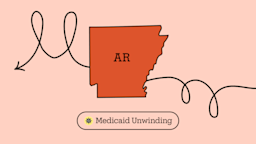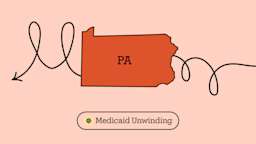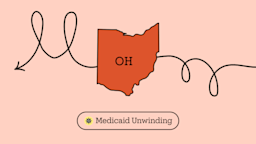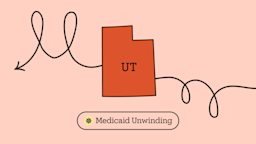Key takeaways:
Medicaid and Children’s Medicaid (CHIP) will no longer renew automatically after March 31, 2023. After this change — which is part of the COVID-19 public health emergency “unwinding” — millions of people are expected to lose Medicaid coverage.
The unwinding means Medicaid coverage will be reviewed through the “redetermination” process. It’s important that your state or territory has your current contact information so they can reach you about your case.
After redetermination, your Medicaid may be either renewed or canceled. Your Medicaid will be renewed if your eligibility can be confirmed. If your Medicaid is not renewed, you may need to consider other options for insurance coverage or free and low-cost healthcare.
For the past 3 years, Medicaid and Children’s Medicaid (CHIP) benefits were renewed automatically for anyone who became eligible during the COVID-19 public health emergency (PHE). Automatic renewal, also known as continuous coverage, meant that enrollees were not required to recertify eligibility every year.
Now the PHE is scheduled to conclude on May 11, 2023. The process of ending the PHE is called “the unwinding,” and it means many special rules made during the pandemic will end. One of the provisions that will be rolled back is automatic Medicaid renewal.
What does Medicaid redetermination mean?
Automatic Medicaid renewal will switch to annual renewal as of March 31, 2023. This means Medicaid redetermination — which is the review process to see if you still qualify for Medicaid — will resume. To make sure your case is reviewed correctly, your state or territory needs to be able to reach you and your family. Make sure your Medicaid agency has your current contact information.
After March 31, 2023, states have 1 year to start renewals and 14 months to finish processing them. Many states have started the redetermination process and are contacting Medicaid enrollees right now. Some people could lose Medicaid and CHIP coverage as early as April 1, 2023.
How many people are expected to lose Medicaid coverage?
An estimated 5 million to 14 million people — and nearly 18 million according to the highest projections — will lose Medicaid coverage as a result of this change. Many of them will no longer be eligible for Medicaid because they now have jobs and income circumstances that give them other insurance options.
Others will still be eligible for Medicaid but will lose coverage because state agencies won’t be able to confirm their eligibility before their current coverage expires. Paperwork problems, long wait times, and other issues could cause what’s called “churn” — which is when people who qualify lose coverage because of administrative delays.
Nearly 7 million people could lose coverage because of churn. Be aware that you might find out that you’re no longer enrolled when you try to access care. State agencies are working to stay in contact with enrollees to avoid churn, but it’s important to be aware that you and your family could fall off Medicaid during the unwinding.
What can I do if my Medicaid isn’t renewed?
If your Medicaid isn’t renewed, you will no longer have Medicaid coverage. If you reapply for Medicaid, you may be uninsured while you wait to be approved. If that happens, there are free and low-cost healthcare options you can consider. And you can use GoodRx to save on your prescription medications.
If you don’t plan to reapply for Medicaid, you should see if you qualify for coverage elsewhere. Depending on your individual circumstances, you may be able to find affordable health insurance with one of these options:
Affordable Care Act marketplace: Through the Affordable Care Act (ACA) exchange, you may be able to find coverage for $10 or less per month if you qualify for a premium subsidy. The end of continuous coverage triggers a special enrollment period (SEP) for people who lose Medicaid coverage. This SEP will last from March 31, 2023 to July 31, 2024. During this time, you can purchase an insurance plan on the ACA marketplace if you lost Medicaid coverage because of the unwinding.
Job-based insurance: If you now have a job that offers health coverage, you may be eligible for employer-sponsored insurance.
Medicare: If you have a qualifying disability or health condition — such as end-stage renal disease or ALS (amyotrophic lateral sclerosis, also known as Lou Gehrig’s disease) — you can enroll in Medicare at any age.
Partner’s plan: If you have a spouse or domestic partner who has insurance, you may be able to join their plan during an open enrollment or special enrollment period.
Special plans: Short-term insurance can be a good choice if you anticipate that a better option, like job-based health insurance, will be available soon. You may also consider alternative and limited-benefit plans, such as fixed indemnity, accident, cost-sharing, and catastrophic insurance plans.
Student health plan: If you’re enrolled in a college or university, you may be eligible for a campus health plan.
Veterans Affairs: If you are an active-duty service member or a veteran, you may qualify for TRICARE coverage or Veterans Affairs benefits and services.
Read more like this
Explore these related articles, suggested for readers like you.
It’s important to note that if you believe you qualify for Medicaid, you should reapply. We’ll discuss that next. But even if you do apply, you may need to explore some of the options above while you wait to be approved.
Can I reapply for Medicaid?
Yes. If you think you’re still eligible, you should reapply for Medicaid. You can do that by contacting your state’s Medicaid agency. Medicaid information by state and territory is provided below.
How does the Medicaid renewal process work?
Medicaid renewal is also known as Medicaid recertification or Medicaid redetermination. During this process, state Medicaid agencies review a person’s eligibility, including their income and health conditions, to determine if they still qualify. Annual Medicaid renewal will resume after March 31, 2023.
The bottom line
Medicaid renewal was automatic during the 3 years of the COVID-19 public health emergency, but automatic renewal — also known as continuous coverage — stops on March 31, 2023. You could lose your Medicaid or CHIP insurance as soon as April 1, 2023.
If you lose coverage, you will be uninsured unless you actively seek out other coverage options. Depending on your age, income, and health conditions, you may be eligible for other types of insurance. Your options could include plans available through the ACA marketplace, which will have a special enrollment period for people who fall off Medicaid. Other avenues for health insurance include Medicare, a job-based plan, a partner’s plan, or a student health plan. If you can’t find an affordable insurance option, you can consider free and low-cost healthcare options.

Why trust our experts?


References
Centers for Medicare and Medicaid Services. (2023). Temporary Special Enrollment Period (SEP) for consumers losing Medicaid or the Children’s Health Insurance Program (CHIP) coverage due to unwinding of the Medicaid continuous enrollment condition – Frequently Asked Questions (FAQ).
Erzouki, F. (2023). States must act to preserve Medicaid coverage as end of continuous coverage requirement nears. Center on Budget and Policy Priorities.
Medicaid.gov. (n.d.). Renew your Medicaid or CHIP coverage.
Medicaid.gov. (n.d.). Unwinding and returning to regular operations after COVID-19.
Tolbert, J., et al. (2023). 10 things to know about the unwinding of the Medicaid continuous enrollment provision. Kaiser Family Foundation.
U.S. Department of Health and Human Services. (2023). Fact sheet: COVID-19 public health emergency transition roadmap.
U.S. Department of Veterans Affairs. (2022). VA/DoD health affairs.


















